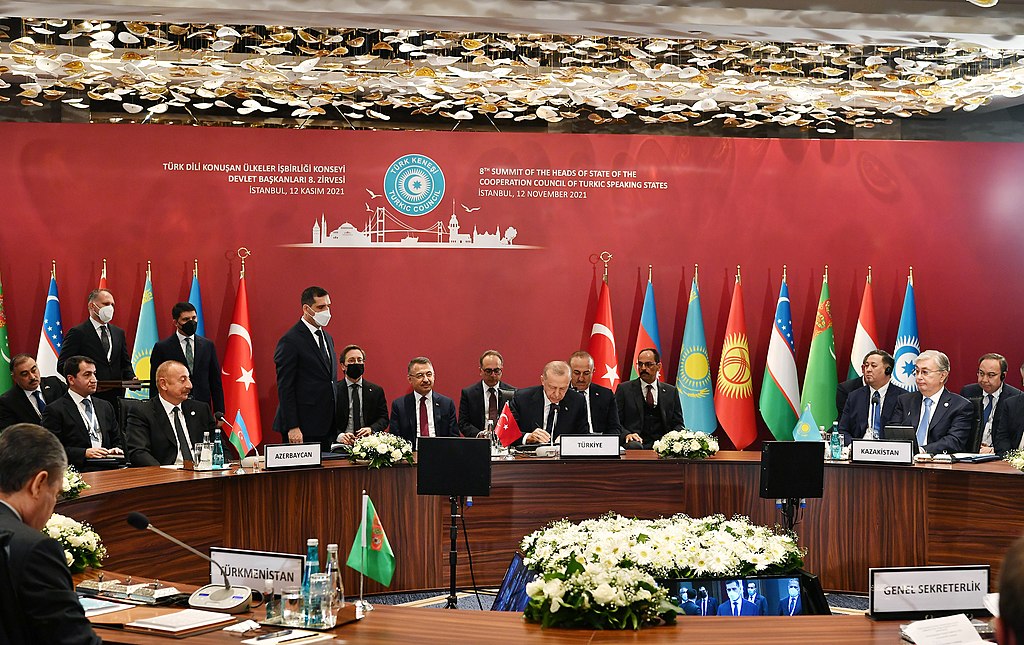The Turkish World in place of the Russian World
From education to foreign policy, the cooperation activities of the Organisation of Turkic States are growing. In the former Soviet countries of Central Asia, Erdogan is increasingly popular. While the project - already begun in Kazakhstan under Nazarbayev - to replace the Cyrillic alphabet with the Latin one, closer to Turkish phonetics, remains in force.
Astana (AsiaNews) - The intensification of the activities and projects of the countries belonging to the Organisation of Turkic States (OTG) is provoking many reactions and comments on the possibility of forming an effective counterweight to Russia's traditional influence on Central Asia. The recent proposal to unify the Turkic alphabet with Latin letters instead of Cyrillic ones, seen as a decisive move towards ‘de-colonisation’, is one of the most discussed topics along with many others, including the return of the Turkic tiger to the Kazakh steppes.
The local and international media, such as the BritishEconomist, which writes about Turkey's continuous rapprochement with Central Asia, citing the recent ‘Nomad Games’ with the participation of 89 countries in Astana, a typically ‘Turkic’ project, intervene on these issues. The countries concerned are obviously Turkey and the four most explicitly Turkic countries in the region, Kazakhstan, Kyrgyzstan, Uzbekistan and Turkmenistan, as well as Azerbaijan and various parts of Russia itself and China. According to the article, ‘the idea of a common Turkic identity greatly frightened the Soviets, and today the same is true of the Russians and Chinese’.
The Otg is increasingly becoming a tool for developing cooperation in many areas, from education to foreign policy. Many institutions and organisations are being ‘reformulated by reducing the presence of Russians’, as Harvard University professor Nargis Kasenova, who is of Kazakh origin, comments. Of course, the state that does the most to replace Russia in the region is Turkey, which annually increases its trade balance with the other Turkic countries to almost billion last year.
At the Nomad Games, a standing ovation greeted the speech of Bilal Erdogan, son of Turkey's president and sports executive, a classic function of climbing to the top of politics in these countries. Recep Tayyip Erdogan's own personality is highly revered in Central Asia, at least as much as it is criticised in the West. Trust in Moscow, on the other hand, has plummeted since the invasion of Ukraine, as Kasenova says, although ‘senior officials in Kazakhstan and other countries try not to irritate the Kremlin, but in private conversations they express their disappointment at Moscow's demands’.
Military supplies are also being sought to reduce dependence on Russia, and Turkey plays a crucial role in this. The Economist recalls that in 2020, Azerbaijan used Turkish drones in the Nagorno Karabakh war, and other countries have also purchased considerable quantities. Kazakhstan even signed an agreement with Ankara to produce Anka drones on its territory.
The Moscow influence is still considerable, for example for the export of Kazakh oil, 80% of which is delivered through Russian territory, not to mention internet traffic, which passes almost entirely through Russia. Kazakhstan and Kyrgyzstan are members of the Collective Security Organisation Csto, the Moscow-based post-Soviet military alliance, almost entirely supplied by Russian armaments. Russian propaganda often insists on repressive actions against the Russian-speaking people of Kazakhstan, threatening possible actions in the northern regions, as has already happened in Ukraine.
Yet the project, still initiated under President Nursultan Nazarbaev, to adopt the Latin alphabet from 2025 remains in place. The main argument focuses on the distortion of Turkish phonetics in the use of Cyrillic, and the switch to the Latin alphabet would also allow these countries to be more integrated into the world economy, opening up greater access to technology and scientific innovations. On the other hand, the alphabet change requires large investments of hundreds of millions of dollars, and is unlikely to be realised before 2030, assuming there is no return of Russian imperial domination over the lands of Central Asia before then.







.png)










